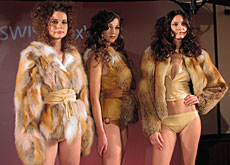
Swiss fur traders to promote native fox

Switzerland's tiny fur industry is hoping to take advantage of an apparent revival in the global fur trade.
National umbrella group Swiss Fur says it plans to promote the country’s native red fox as a fashion item.
Representing more than 50 Swiss furriers and retailers, the organisation plans to issue easily recognisable labels along with certificates of authenticity for items of clothing made from domestic fox fur.
Since fur farms are banned in Switzerland, along with animal traps and the use of poisons, the label is being promoted as an assurance against animal cruelty.
Swiss Fur also claims that its plans to promote home-grown fur are environmentally sound, since it will only be using the furs of foxes which have already been killed as part of federal population controls.
“At the moment, there are around 45,000 foxes being shot in Switzerland every year just to keep fox numbers in check,” says Swiss Fur president Jacques Sinz. “These numbers are regulated by the national environment agency and by the cantons, who sell the hunting licenses to private hunters.
“But once the foxes have been killed, there is currently no market for their furs and the vast majority end up being incinerated or thrown away, which benefits no-one. We just want to bring the red fox back into the marketplace, so it can be worn.”
Innovative designs
As well as tackling questions of conscience, Swiss Fur hopes to appeal to the fashion sense of prospective buyers, using innovative designs and new technologies.
“We can do incredible things now with the fashioning and colouring of furs, so we’re not just talking about traditional coats,” says Sinz. “I’m convinced that we will have a fur revival, especially because the top international designers are rediscovering fur – in all these new forms.
“Here in Switzerland we don’t really have a fur-producing industry in the same way other countries have. At the moment it’s more just a small collection of handcraft workers. But we don’t see any reason why we can’t produce something similarly fashionable with our own native red fox.”
Buying cruelty
Swiss Fur’s arguments do not impress the country’s animal rights groups, however.
“The amount of fur produced in Switzerland is negligible compared to the amount that is imported,” Swiss Animal Protection spokesman Mark Rissi told swissinfo. “Much of the imported fur still comes from fur farms – so when people buy fur, they are buying cruelty.
“It’s certainly true that an animal hunted in the wild in Switzerland will have lived a better life than one which was raised in a fur farm but, since we’re talking about such a small share of the market, this whole label idea simply looks like a ruse by the industry to confuse the public.”
While Swiss Fur looks to promote the sustainability of indigenous fox fur, Swiss Animal Protection has made its own opinions equally clear.
The organisation recently joined in an international campaign launched by American animal rights group Peta against the use of fox fur. Pinching a little of the glamour look from their opponents, the campaigners used a glossy picture of a pop singer in evening dress holding up the remains of a skinned fox.
While striking in its own right, though, the image has also been seen as an indication of the current anxiety in animal rights circles, and as further proof that the “fur wars” are far from over.
swissinfo, Mark Ledsom in Zurich
Switzerland’s federal environment agency permits the hunting of around 45,000 foxes a year, to restrict excessive population growth.
Most cantons control their fox populations by selling hunting licences to the public.
Those seeking a licence must first pass a test, and adhere to restrictions on where and when they can hunt.
Canton Geneva is the only canton to have banned private fox hunting, with local officials instead taking charge of fox control.

In compliance with the JTI standards
More: SWI swissinfo.ch certified by the Journalism Trust Initiative




























You can find an overview of ongoing debates with our journalists here . Please join us!
If you want to start a conversation about a topic raised in this article or want to report factual errors, email us at english@swissinfo.ch.